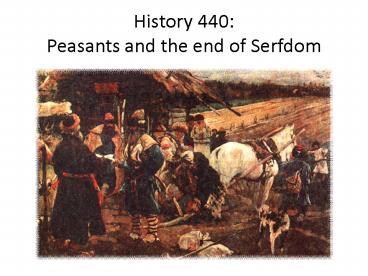History 440: Peasants and the end of Serfdom - PowerPoint PPT Presentation
1 / 11
Title:
History 440: Peasants and the end of Serfdom
Description:
History 440: Peasants and the end of Serfdom Pre-1861 peasants lives Serfdom: an unequal, reciprocal relationship Land was power Lords owned the land Exploitation ... – PowerPoint PPT presentation
Number of Views:63
Avg rating:3.0/5.0
Title: History 440: Peasants and the end of Serfdom
1
History 440 Peasants and the end of Serfdom
2
Pre-1861 peasants lives
- Serfdom an unequal, reciprocal relationship
- Land was power
- Lords owned the land
- Exploitation was central
- Labor rent (barshchina)
- Payment in cash or kind (obrok)
- Up to half their harvests went to lord and the
state. - Harshest close to center of power.
3
Pre-1861 peasants lives
- The States impositions
- Poll tax (Peter I, until 1880s)
- Military service Peter I lifetime service in
1793 reduced to 25 years - 1720-1867 7 million peasant men conscripted.
- Peasant communities were jointly responsible for
all obligations (until 1903) - Landlord also had responsibilities protection,
safety net, authority
4
Weather and soil
- North and northwest
- forest, poor soil
- Winters long, low precipitation
- South and southeast
- Semi-forested steppe
- quite fertile (Black Earth)
- Weather varied
- Led to redistributive commune
- Spread risk
5
Regional economic patterns
6
How did they farm?
- Subsistence
- Three-field system
- No legumes or potatoes
- Some livestock, but small, underfed
- Resistant to improvement
- Preferred security of old methods
- KEY Redistributive commune
- Large households
7
But population grew enormously
- 1678 9 million
- 1795 20 million
- 1857 32 million
- 1914-1917 90 million
- With conquests, by 1917 172 million (80 percent
peasants) - And spread out extensive (not intensive)
agriculture
- Why?
- Peasants married young
- Had many babies
- So some survived
- Landlords encouraged this.
- Created a strong pro-birth mentality.
- Hard habit to break.
8
Gender differences
- Sexual exploitation, especially of
daughters-in-law - Men heavy field work plowing, harrowing, sowing
- Women household, children, kitchen garden, small
animals - Everyone harvested
- Also generational conflict
9
Peasants resistance
- Flight (common earlier)
- Revolt
- 1606-7 Bolotnikov revolt (reached Moscow)
- 1670-1 Razin revolt
- 1707-8 Don Cossack revolt
- 1773-4 Pugachev revolt
- All were suppressed with massive state violence
10
Peasants resistance
- Weapons of the weak
- Worked badly
- Stole estate property
- Broke new machines
- Late paying dues
- Feigned incomprehension
- Hid in the woods
- Took solace in the churchs promised afterlife
11
Finally, Emancipation, 1861































